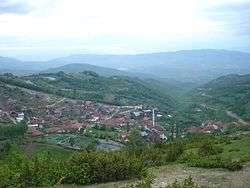Cvetovo
Cvetovo (Macedonian: Цветово) is a village in the municipality of Studeničani, North Macedonia.
Cvetovo | |
|---|---|
Village | |
| Цветово | |
 Cvetovo | |
 Cvetovo Location within North Macedonia | |
| Coordinates: 41°51′N 21°25′E | |
| Country | |
| Region | |
| Municipality | |
| Population (2002) | |
| • Total | 807 |
| Time zone | UTC+1 (CET) |
| • Summer (DST) | UTC+2 (CEST) |
| Car plates | SK |
| Website | . |
History
During the great migration movements in Macedonia at the end of the 17th and beginning of the 18th centuries, Macedonian Muslims left the Debar area for the central regions of Macedonia and established villages such as Cvetovo located in the Skopje area.[1]
Demographics
Cvetovo has traditionally been inhabited by a Macedonian Muslim (Torbeš) population.[1] The mother tongue of Cvetovo inhabitants and of daily communication is Macedonian.[2]
According to the 2002 census, the village had a total of 807 inhabitants.[3] Ethnic groups in the village include:[3]
- Turks 805
- Others 2
gollark: You said "school".
gollark: There are not many things like that.
gollark: Maybe there are people other than average users.
gollark: And the ability to actually add other FS types (FUSE).
gollark: Oh, and sensible filesystems, that's good.
See also
References
- Vidoeski, Božidar (1998). Dijalektite na makedonskiot jazik. Vol. 1. Makedonska akademija na naukite i umetnostite. ISBN 9789989649509.CS1 maint: ref=harv (link) p. 126. "Еден дел од торбешката група, кои на крајот на XVII век и во почетокот на XVIII-иот, во времето на големите миграциони движења во Македонија, ја напуштило старата територија (Дебарско) и се преселило во централните области на Македонија. Така се формирале шет торбешки села во Скопско (Пагаруша, Д. Количани, Држилово, Цветово, Елово, Умово) и две Велешко (Г. Врановци и Мелница)."
- Idrizi, Xhemaludin (2003). Mikrotoponimia e Karshikës së Shkupit [Microtoponyms of Skopje’s Karshiaka region. Skopje: Interdiskont. pp. 17, 51. ISBN 9989-815-37-2.CS1 maint: ref=harv (link)
- Macedonian Census (2002), Book 5 - Total population according to the Ethnic Affiliation, Mother Tongue and Religion, The State Statistical Office, Skopje, 2002, p. 184.
| Wikimedia Commons has media related to Cvetovo. |
This article is issued from Wikipedia. The text is licensed under Creative Commons - Attribution - Sharealike. Additional terms may apply for the media files.